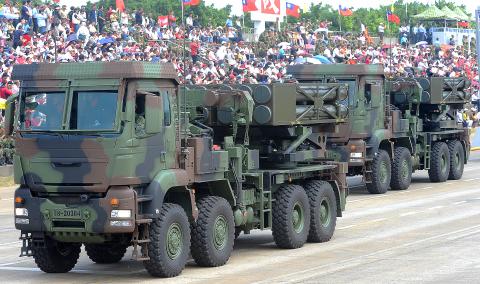|
Strait ¡¥detente¡¦ is
unilateral, critics say
WAR AND PEACE: The nation has reduced spending
on defense and is now acquiring non-combat platforms like excavators and rafts
as China¡¦s budget continues apace
By J. Michael Cole / Staff reporter

Trucks carrying Ray Ting 2000, or
¡§Thunder 2000,¡¨ multiple rocket launchers drive past spectators at a rehearsal
for the annual Double Ten National Day parade at the 584th Armored Brigade¡¦s
base in Hsinchu County¡¦s Hukou Township on Sept. 20 last year.
Photo: Liu Hsin-de, Taipei Times
Low spending on national defense as well
as cuts in projected weapons acquisition, are signs that the armed forces are
moving away from a combat-oriented to a relief-oriented military role and that
detente in the Taiwan Strait is ¡§unilateral,¡¨ critics of President Ma Ying-jeou¡¦s
(°¨^¤E) administration have said.
During the presidential campaign in 2008, Ma vowed to bring spending on national
defense to 3 percent of GDP, a pledge that he has not met in his four years in
office. The proposed national defense budget for next year has been set at
NT$314.15 billion (US$10.59 billion), lower than the NT$317.2 billion for this
year.
China, meanwhile, has increased its military spending by double digits for most
of the past decade, opposition lawmakers said, adding that this highlighted
ignorance about the true nature of the Chinese threat on the part of the Ma
administration.
This year, China¡¦s declared military budget will rise 11.2 percent to 670.27
billion yuan (US$106.41 billion), a figure that the Pentagon and military
analysts argue does not reveal actual levels.
Beyond a failure to meet the target defense spending, appropriations for next
year also indicate a shift away from combat readiness to operations other than
war, predominantly relief operations, reflecting Ma¡¦s 2009 announcement that
natural catastrophes were now Taiwan¡¦s ¡§No. 1 enemy.¡¨
The Chinese-language United Daily News reported on Sunday that initial plans by
the army to procure 57 domestically produced Ray Ting-2000 (¡§Thunder 2000¡¨)
multiple rocket launchers for a total of NT$14.45 billion had been slashed by
one-quarter in next year¡¦s budget. According to the report, the Ministry of
National Defense ordered in July last year that production be dropped to 43
launch vehicles, which are to be divided into three battalions. The budget for
the acquisition has reportedly been cut to NT$13.22 billion.
Meanwhile, the ministry has set aside NT$860 million for eight new projects, of
which more than half are to meet non-combat needs. Among the earmarked funds,
NT$430 million has been set aside to purchase 73 excavators and loaders and
NT$45 million to buy 128 rubber rafts.
The army said the purchases were to ¡§strengthen disaster prevention and rescue
capabilities and to expand the army¡¦s capability to speedily repair roads and
dredge waterways and reservoirs.¡¨
Opposition lawmakers commenting on next year¡¦s defense budget said
appropriations failed to ensure the nation had the means to guarantee its
defenses.
¡§The Ma administration has continually scaled back its military spending even
though China¡¦s threat to Taiwan has continued to rise over the past few years,¡¨
Democratic Progressive Party Legislator Hsiao Bi-khim (¿½¬üµ^) was quoted as saying
at the weekend.
Despite the relative calm in the Taiwan Strait since Ma¡¦s election, Hsiao said
the lack of reciprocity was impossible to ignore.
¡§The detente is just unilateral,¡¨ she said, pointing to the 1,600 ballistic and
cruise missiles China has aimed at Taiwan ¡X 200 more than last year, according
to a report by the ministry on the People¡¦s Liberation Army that was submitted
to the legislature last week.
Additional reporting by AFP and Jake Chung
|
![]()
![]()
![]()